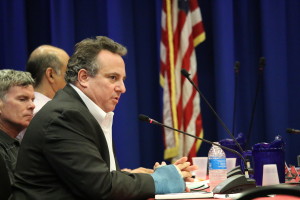By Eishna Ranganathan
Managing Editor
During the summer, school board representatives, teachers, and administrators continued to discuss district matters in order to create dialogue, reach conclusions and prepare for major changes in the upcoming school year. Three large “hot topics” included the introduction, and now departure, of a superintendent, 5-8 grade changes and contract negotiations.
Newfound Authority
Joining Neshaminy from his previous Bensalem-School-District-affiliated position, David Baugh began his interim term as Acting Superintendent of Schools in early July and will officially depart on Oct. 2 for Centennial School District, although he is not currently physically within the district anymore. Based on his contract, the district will pay him $640 per day until then. The board hopes to choose a permanent authoritarian by January.
Superintendents, for Neshaminy, are selected based the school board’s choice of candidate, upon holding several interviews; on June 16, with an 8-0 unanimous vote, the board hired Baugh. On Sept. 8, the Centennial School Board hired him with the same vote to replace Joyce Mundy who retired in early April.
Baugh’s contract extends until June 2020 and starts with a base salary of $175,000.
Former superintendent, Robert Copeland, resigned his $181,000 per year position in May and transferred to Lower Merion – where he earns $240,00 per year with annual raises until 2020. Upon reflecting on his time at Neshaminy, Copeland stated he really enjoyed his time and wishes it a productive school year.
“I think the district has made a great beginning in bringing back world languages to the middle school. I hope they decide to continue that path… I would advise [Baugh] to continue an active presence in the community and continue a drive for excellence,” he said.
Additionally, Paul Meehan now serves as the Director of Administration; he started his term on Aug. 7 and earlier was the Principal of William Penn Middle School. His role within Neshaminy involves supervision of all the principals, oversight of the professional staff’s evaluation process, governance of instructional staff needs in each building, and implementation of the budget in a fiscally responsible manner.
Meehan believes “Neshaminy has a strong reputation of being a great district academically and promotes the development of the whole child; which is part of [his] personal educational philosophy.” He hopes to continue making decisions based on what is right for the students.
“I will always look for opportunities to support our school leadership teams so they can continue to make their individual school’s great learning communities,” Meehan said.
Tawanka Talk and Transition
Neshaminy is one of the few districts in the nation to incorporate fifth graders in its middle schools; this Sept. will be will be the first year of implementation. The school board made the decision last school year and has been working to smooth the transition and ease tensions among itself and the community ever since the verdict.
The groundbreaking ceremony was held in late June; the expected completion date for the Tawanka super-school is summer of next year. In order to prepare community for the consolidation, the district website contains a special section dedicated to 5-8 updates and features videos of Poquessing, Sandburg and Maple Point Middle Schools welcoming the fourth and fifth graders.
Upon making this decision, the board encountered much criticism from parents and educators. “I think the board should have listened more to the community instead of wasting time on conflicts and justifying themselves. For example, the district should have more of a language focus; Spanish should be taught in Kindergarten and Chinese in fifth grade to actually prepare for a global world,” community member, Charles Alfonso, said.
“Obesity in kids is also a large problem; calisthenics should be required more frequently, as a class even – to have fresh oxygen flowing to the brain so they would be more focused in the classroom as well,” Alfonso said.
Neshaminy will also close down three elementary school as part of this consolidation model of which are Lower Southampton, Samuel Everitt and Oliver Heckman. Some had farewell get togethers, planned by the PTA for students to say goodbye to their former schools.
“How well we have been able to deliver on the promises we made the public regarding these changes… Change is hard, hard for some to expect, hard for some to believe; in our case it’s both. Sizing our District to its current and future expected population was needed for Neshaminy to prosper,” board member, Stephen Pirritano said.
In the spring, when the board voted on school closures, the results had a similar 7-2 approval pattern; Michael Morris and Ron Rudy composed the opposition. “The problem with Neshaminy is politics. Neshaminy school boards are elected by regions and because of that they feel obligated to the local party bosses and not the entire district. I was a no vote for the new school; I still think it was a mistake,” Morris said.
Due to the different system, transportation will be affected accordingly, with different busing arrangements resulting from the greater influx of students to middle schools. Feeder patterns will remain the same for current students until the 2016-17 year arrives, meaning those in current attendance at their school will remain that way despite boundary rearrangements.
“[Young students] will be required to walk to school while older children ride the bus. The children will probably accept the move up better than parents …. Of course, parents understand what can and will happen when young children are put into adult like situations they are not prepared to handle,” Morris continued.
Overall Tawanka construction and elementary closure is supposed to result in a net gain of $2 million for Neshaminy. The formerly-active schools are planned for use by the Bucks County Intermediate Unit and for special needs kids’ purposes.
Contract Considerations
The Neshaminy Federation of Teachers ratified their one-year contract on July 27. The Act 93 contract for administrators also remained a topic of discussion – the final determinant was the Aug. 25 meeting.
“Most of the controversial items such as Memorandums of Understanding, employee’s contributions to health care, past practice, equal say and a host of others were settled the last contract. The current contract was settled amicably because there were no major disagreements,” Morris said. The NFT received financial concessions from the District as well.
In 2011 similar negotiations were held, but due to differences in opinion amongst the board and NFT, the latter went on strike twice during the 11-12 school year, but reached a compromise upon the next year’s closing. It featured a salary increase, while asking greater contribution to insurance premiums.
“I think the fact that the negotiations this time were done in a ‘closed room environment’ was conducive to obtaining a new deal. In the past there was much distraction from the local paper and social media… negotiators on both sides wanted to negotiate a fair contract… I don’t remember that desire to work together last time,” science teacher, Ken Bader said.
The recently agreed-upon deal includes no universal salary increase except to those educators who continue earning credits (classified as educational attainment), a continued health care contribution, save average class size and no additional cost to taxpayers.
“We surveyed the staff via SurveyMonkey to formulate a proposal based on the results and requests of the members… we hope to, in the future, have a longer duration for a contract and continue the positivity expressed. There is too much going on [in Neshaminy] to have labor-management disputes,” NFT negotiator and English teacher, Suzi Drake, said.
Final Thoughts
“We are investing in infrastructure, technology, programs all with the goal to build a better life for the students and staff of Neshaminy. When you leave this district and head to whatever your future endeavor may be we want you to look back and say Neshaminy was a good experience and it gave me the tools necessary to become a viable member of society,” school board member, Mark Shubin said.








